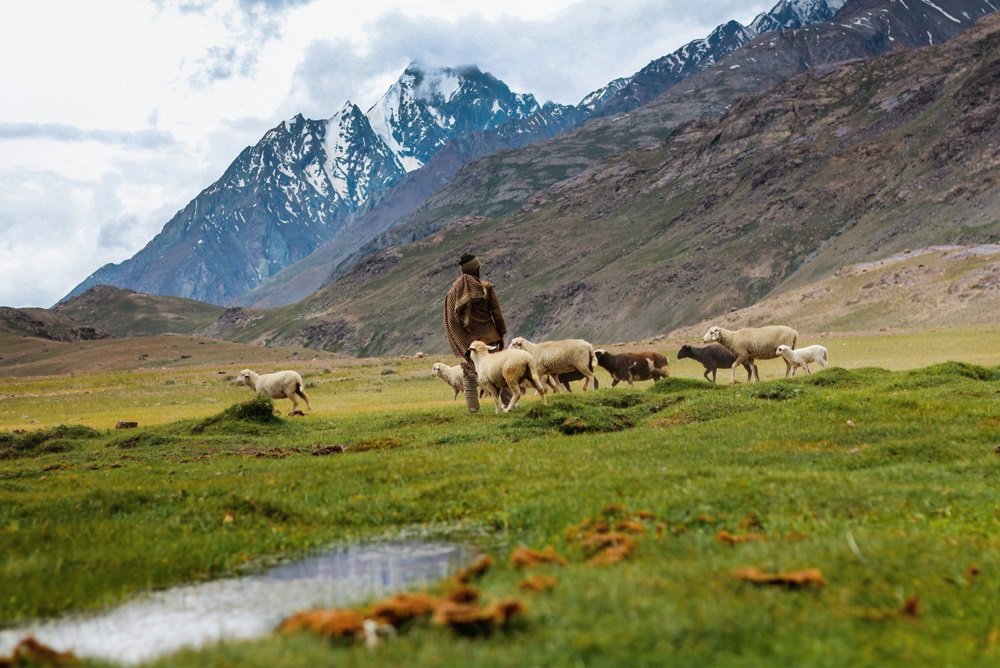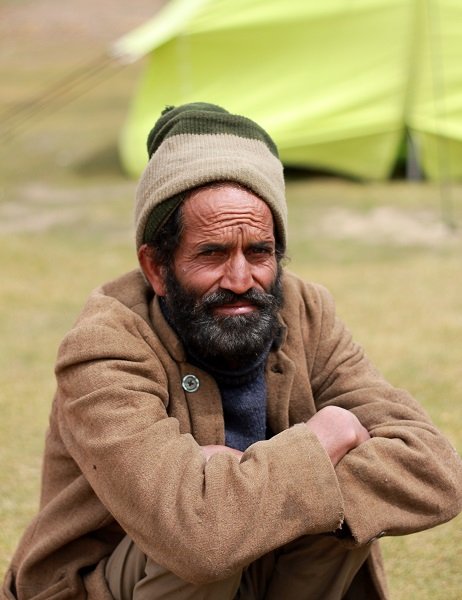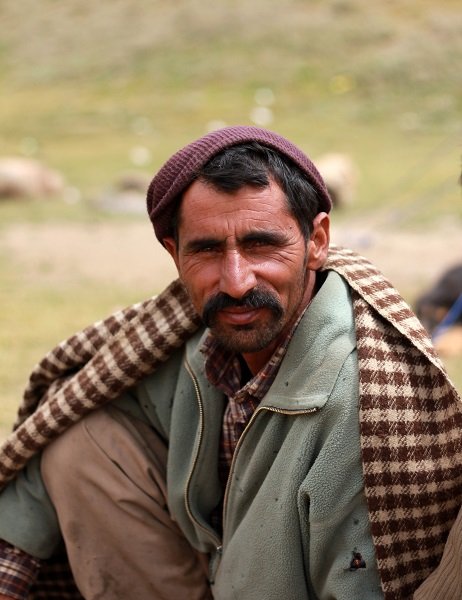
I had survived the storm. It was 7 am and at nearly 14,000 ft I couldn’t sleep any longer. I set my foot out of the tent into the wet grass, and felt the tiny wisp of moisture on my lips dry away in an instant. I turned around and started walking towards the nearby hillocks wanting to get a better view of the surrounding area.
As I got closer the view parted and I noticed hundreds large dots of white, brown and some even black in color. Sheep—I figured as much, but how in the world did they get here? We were half a day’s ride away from any major village in the mountains.
Last evening, I had ridden into a small plateau, wedged between the roaring river hundreds of feet below and the towering Himalaya beside it. Having been forced to pitch my tent twice in the dark of the night, with the howling wind for company, just a couple of miles south of, ‘Chandertaal—Lake of the Moon,’ I was certain that I would fly away with my temporary abode by dawn.
When I reached the site, I heard a few dogs barking, and there were a handful of them on duty. I looked around and found their masters surrounded by their flock of sheep and walked towards them for a conversation. These two shepherds were part of the ‘Gaddi’ tribe—a nomadic tribe that habitats parts of Himachal Pradesh, one of the northernmost and prettier states of India. The original Gaddi tribes seemed to have migrated to these areas from parts of Central Asia, Rajasthan and even Gujarat, altho there isn’t much documented evidence of their origins today.
I exchanged pleasantries with the older of the two and introduced myself. The elder of the two identified himself as, ‘Kashmir Singh Rana,’ and the other as, ‘Bahadur Singh Rana.’ I was curious and asked them if they are father and son to which, ‘Kashmir’ responded saying that, ‘Bahadur’ was his grandson. Now in disbelief, I continued my chat with them to find out more about them and their tribe.
Their main occupation is shepherding and they sell sheeps and goats for wool. They had over 500 sheep to their name and all of them were marked. They also had a few mules and horses at their village somewhere deep in the state. They were far from their home as the grass is great in these parts for grazing, and they had to work to feed their families. It was summertime and they were exploring the upper hills and often retreat back during the freezing winters.
Both their attires were homemade using sheep wool, and they sported woolen trousers, long shawls and caps.
I asked them stories from their lives and they spoke about how one of the years they were caught up in the storm crossing Rohtang La (a treacherous pass with summit at over 13000 feet) and a lightning strike killed some of their sheep.
The mentioned how floods had ravaged their land and forced them to work harder as some had lost their homes and sheeps. But luckily one of the years when destruction struck them, the government did come to their assistance. I was happy to learn about that.

We shared stories about our land and life. My home is nearly 2000 miles south of our current location and life vastly different. These shepherds had lived their entire lives traveling within 250 sq.kms of land. They asked me if I liked what I have seen in my travels through Spiti Valley so far. I replied affirmatively saying that I’ve seen beauty in the harshness of the land and it was incredible. This is what I’ve wanted for a decade, and now that I’m here, I’m also grateful for having made this far.

The weather improved shortly and I had to ride to the lake. Just as I left, I asked them, ‘if they feel the same way, do they find insurmountable beauty in the stark naked and contrasting harshness of these mountains, just as you and I would?
I put forth my question and then left to visit the lake. When I returned, Kashmir Singh Rana had come to the campsite with his grandson and his loyal dogs and we resumed our conversation. He had all the answers ready for me.
He replied in all honesty, “Spiti is our home. As nomads of this land, we travel far and wide accompanied only by our dogs to help graze our sheep and sell its wool to provide for our families. We may fight with nature to survive sometimes, and occasionally wish for a better life. But, we are content and happy because this is where we belong. After all, this is the land of our birth, sustenance and passing. We are born from this earth, indebted to it and ultimately one day we will merge with it.”
This was the ultimate truth and in his original words I realized the enduring spirit of the great tribes originating from Spiti Valley. I continued my travels but my conversation with the shepherd remains etched forever in my mind.
I shot the first photograph when it was time for us to part ways. I printed these photographs and a couple more and sent it to his address. I can only hope and wonder if these would have reached him, and I hope he remembers our meeting.
Circa 2012
I’m sure @onceuponatime you must be missing your days up in Manali riding to all these places and more. Maybe some of my posts will refresh your memories of riding in these parts back in the day!
Thank you for your attention and support!
If you like my work, please share my posts and follow my blog to support me. You may also continue reading my recent posts which might interest you:
- FireTravels #3—Pictures From One Of The Best Butterfly Conservation Parks In India
- Successful #1 India Steemit Accelerator and Steem Cryptocurrency Meetup 2017!
- How Does One Get Over 500-3000 Votes Per Post on Steemit?
- LetsTalk—Results From Leveraging Facebook To Promote Steemit Content!
